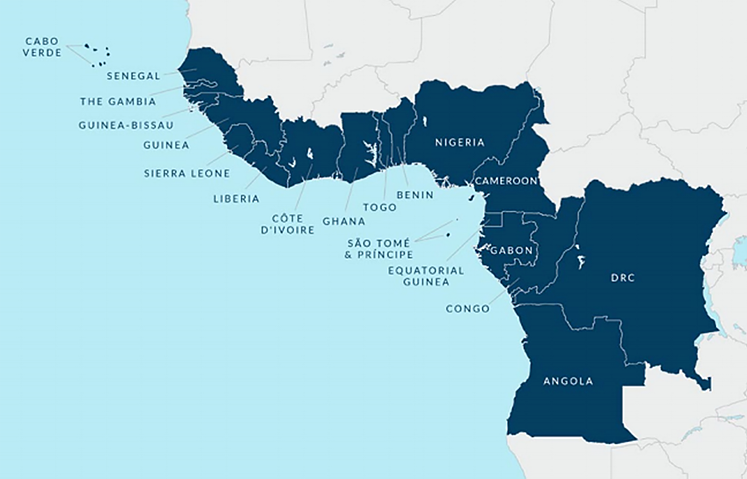Why seas matter: maritime governance and people-centered security
In a small coastal village in the Gulf of Guinea, Kofi, a fisherman, is mending his nets by the shore. His wife, Ndeye, is just back from the market where she sold all the fish caught the day before. She is happy because she now has the money to buy food for their children and finance the next fishing expedition, a central role women often play in this part of the Gulf of Guinea. Kofi will be back at sea tomorrow.
Captain Sene, a naval officer, and his companion, a local lower court judge named Adebayo, approach Kofi to chat.
“How is the fishing today?” Sene asks Kofi.
“You know, sir, traditional fishing has become difficult,” says Kofi. “Big fishing companies are spoiling the resources and pushing us to go farther and farther from the coast. We find more pollution. And the sea is now a dangerous place because of all the bandits. It is harder to feed our families.”
“I hear you, Kofi. We're doing our best to patrol these waters, but the vastness of the sea makes it a challenge. Piracy and illegal activities have thrived, and we cannot control all maritime activities and protect maritime resources.”
Judge Adebajo interjects: “Captain Sene, what measures are being taken to address this issue? The impact is not only on the fishermen but on the development and stability of the entire region.”

Map: Stable Seas (2020), Herbert L. Anyiam, “The Legalities of Gulf of Guinea Maritime Crime with Suggested Solutions”
“We've increased patrols and collaboration with neighboring countries. But there's a need for better coordination, intelligence sharing, and stronger national and international legal frameworks to prosecute pirates. The waters are vast, and challenges are many - not just pirates but also other illegal activities, environmental crimes, and the impact of climate change.”
Judge Abebajo nods. “I've seen cases in my court related to maritime crimes, but the existing laws are not always sufficient to prosecute them, and the judicial process can be slow.”
This conversation has almost never happened, because – according to our latest research report - when it comes to discussing maritime security governance, regional and national institutions in the Gulf of Guinea rarely involve local communities. And they’re not alone.
CHARTING THE SCALE OF THE CHALLENGE
About 80% of the world’s population lives less than 300 km from a coastline. Oceans are not only places to catch fish, or transit zones for ships carrying goods around the world. They are also hugely important to the security and wellbeing of the hundreds of millions of people who depend on them. This is especially true for communities in coastal areas such as the western part of the Gulf of Guinea, which stretches from Senegal to Nigeria.
80% of the world’s population lives within 300 km of a coastline.
Navigating the open seas, one sees firsthand the importance of ensuring freedom of travel and passage. Securing maritime routes is not just a strategic goal; it directly impacts the livelihoods of countless individuals who depend on maritime trade. The economy in some countries in the Gulf of Guinea would suffer from even a short interruption to the flow of maritime supplies, with consequences for the population and, ultimately, the stability of the country.
The protection of maritime resources is also crucial for environmental, economic, social, and security reasons. Oceans are a vital source of economic resources, including fish, shellfish, coral reefs, minerals, oil and gas, and other marine products. In the Gulf of Guinea, the fishing industry is a significant contributor to the global economy and provides a livelihood for millions of people.
Finally, maritime routes are frequently exploited for illicit activities, including human trafficking and the smuggling of drugs and weapons. These crimes pose a direct threat to human security. Maritime security governance plays a pivotal role that national and regional institutions must strengthen. It requires creating and implementing policies, regulations, and cooperative frameworks that not only safeguard the oceans, but also address the consequences of illegal behavior on communities ashore.

Hervé Auffret (left), Alexander Walsh (center), and Micheline Dion, Head of the Union of Women's Fisheries Cooperative in Côte d’Ivoire discuss the challenges of communities and governments working together when it comes to maritime governance.
Photo: DCAF
At the request of Ireland and Germany, DCAF conducted a survey of the challenges and initiatives underway to try to improve maritime security governance in the Gulf of Guinea. The report, authored by myself and Alex Walsh, SSR Programme Manager, offers six recommendations for the international community to support the improvement of maritime security governance in the region. You can read the findings and recommendations here.
 Share on Facebook
Share on Facebook Share on Linkedin
Share on Linkedin Share on Twitter
Share on Twitter